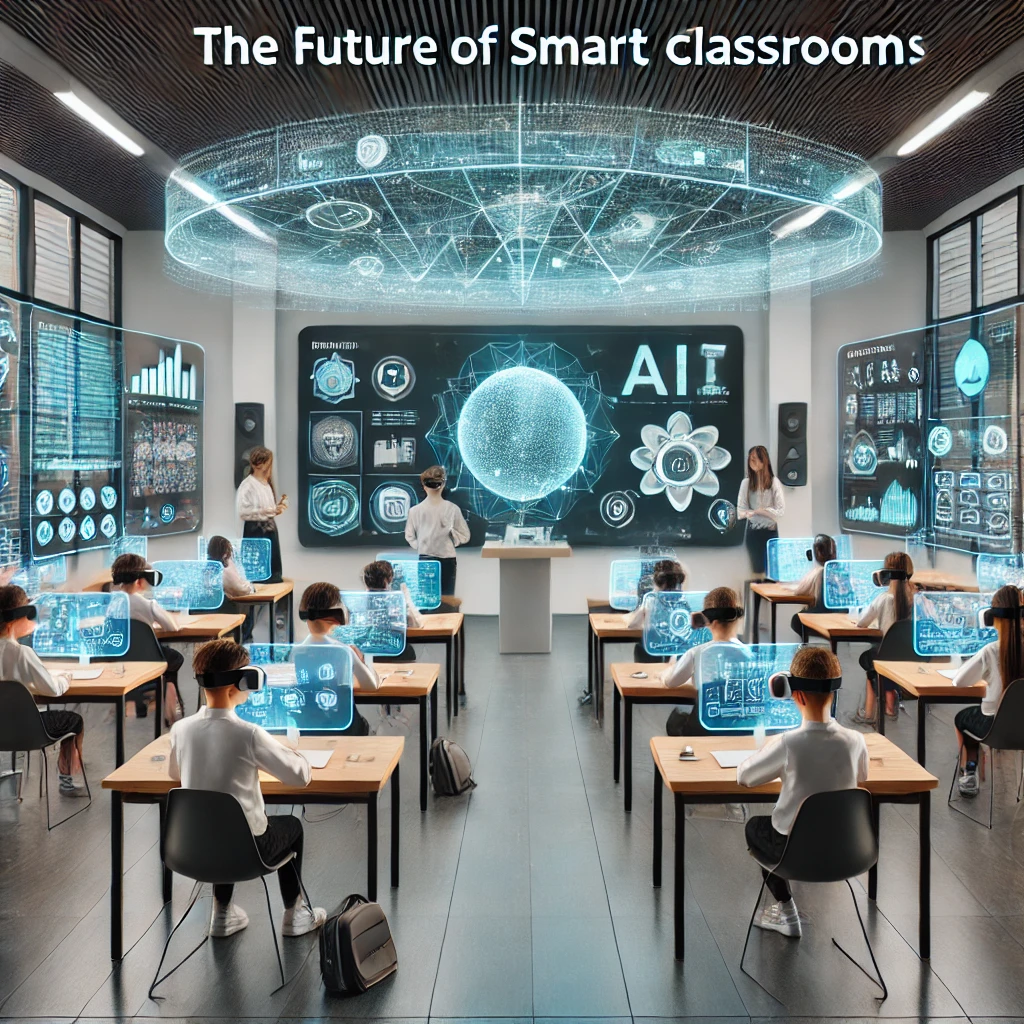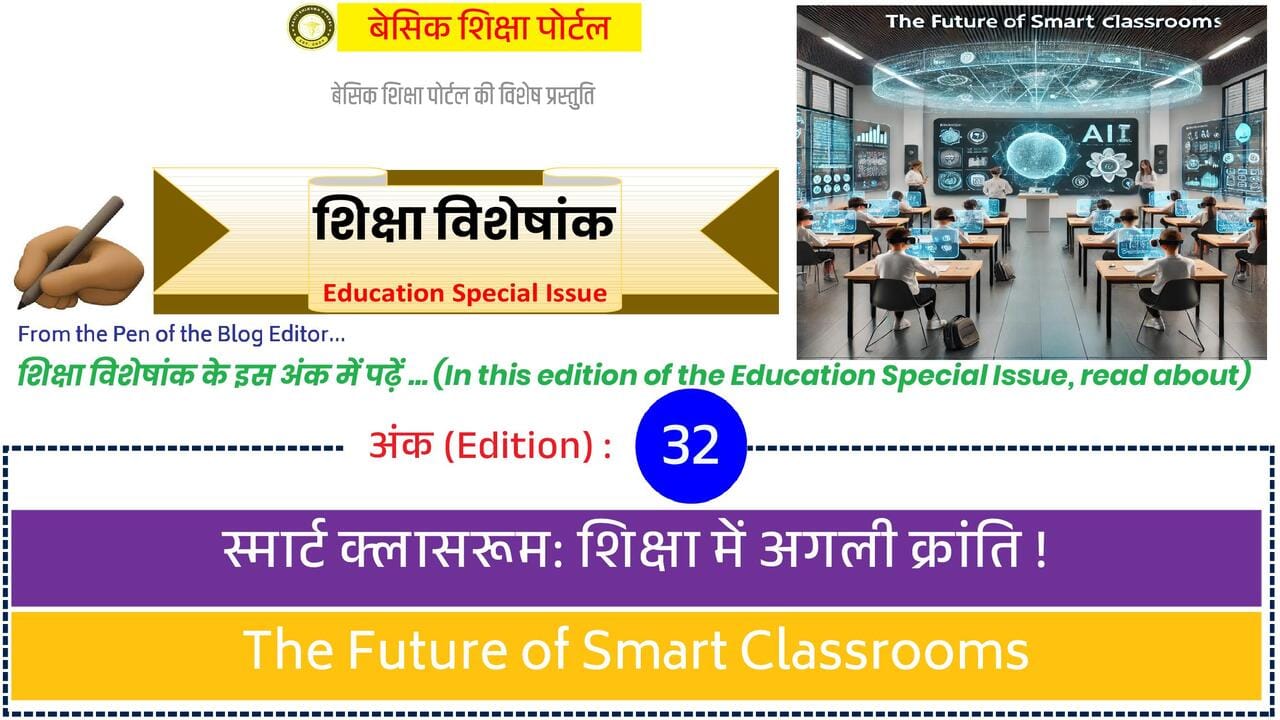Smart Classrooms AI, VR और IoT के साथ शिक्षा में क्रांति ला रहे हैं। जानें कि ये तकनीकें सीखने के भविष्य को कैसे बदल रही हैं। अधिक जानकारी के लिए पूरा लेख पढ़ें!
नमस्कार पाठको,
शिक्षा विशेषांक सीरीज के अंतर्गत आज हम “स्मार्ट क्लासरूम का भविष्य (Future of Smart Classrooms)” इस टॉपिक पर चर्चा करेंगे। तकनीकी विकास (Technological Advancement) के साथ शिक्षा का तरीका भी बदल रहा है। स्मार्ट क्लासरूम (Smart Classrooms) ने पारंपरिक शिक्षा प्रणाली को पूरी तरह बदल दिया है। यह न केवल पढ़ाई को रोचक बनाता है बल्कि छात्रों की समझ को भी गहरा करता है। आइए, जानते हैं कि स्मार्ट क्लासरूम का भविष्य क्या है और यह शिक्षा को कैसे बदल रहा है।

स्मार्ट क्लासरूम क्या है? (What is a Smart Classroom?)
स्मार्ट क्लासरूम (Smart Classroom) एक ऐसा शिक्षण मॉडल है जहां तकनीक (Technology) का उपयोग करके पढ़ाई को और भी प्रभावी बनाया जाता है। इसमें इंटरएक्टिव व्हाइटबोर्ड (Interactive Whiteboard), प्रोजेक्टर, टैबलेट, कंप्यूटर और इंटरनेट जैसे टूल्स का इस्तेमाल होता है। यह छात्रों को विजुअल और ऑडियो के माध्यम से पढ़ाई करने का मौका देता है।
स्मार्ट क्लासरूम के फायदे (Benefits of Smart Classrooms)
- इंटरएक्टिव लर्निंग (Interactive Learning):
स्मार्ट क्लासरूम में छात्र वीडियो, एनिमेशन और गेम्स के जरिए पढ़ाई करते हैं, जिससे उनकी समझ बेहतर होती है। - समय की बचत (Time-Saving):
डिजिटल नोट्स (Digital Notes) और ई-बुक्स (E-Books) से छात्रों को किताबें लेकर चलने की जरूरत नहीं पड़ती। - वैश्विक शिक्षा (Global Education):
स्मार्ट क्लासरूम में छात्र दुनिया भर के शिक्षकों और छात्रों से जुड़ सकते हैं। - पर्सनलाइज्ड लर्निंग (Personalized Learning):
हर छात्र की जरूरत के अनुसार पढ़ाई का तरीका तय किया जा सकता है। - पर्यावरण के लिए बेहतर (Eco-Friendly):
कागज का उपयोग कम होने से पर्यावरण (Environment) को फायदा होता है।
स्मार्ट क्लासरूम का भविष्य (Future of Smart Classrooms)
- आर्टिफिशियल इंटेलिजेंस (Artificial Intelligence):
भविष्य में AI (Artificial Intelligence) के जरिए छात्रों की कमजोरियों को पहचानकर उन्हें सुधारने में मदद मिलेगी। - वर्चुअल रियलिटी (Virtual Reality):
VR (Virtual Reality) के जरिए छात्र किसी भी ऐतिहासिक स्थल या प्रयोगशाला में वर्चुअल टूर (Virtual Tour) कर सकेंगे। - ऑगमेंटेड रियलिटी (Augmented Reality):
AR (Augmented Reality) से पढ़ाई और भी रोचक हो जाएगी। जैसे, विज्ञान के प्रयोगों को वास्तविक रूप में देखना। - इंटरनेट ऑफ थिंग्स (Internet of Things):
IoT (Internet of Things) के जरिए क्लासरूम में सभी उपकरण आपस में जुड़े होंगे, जिससे पढ़ाई और भी सुविधाजनक हो जाएगी। - ब्लॉकचेन टेक्नोलॉजी (Blockchain Technology):
यह टेक्नोलॉजी छात्रों के डेटा (Data) को सुरक्षित रखेगी और उनकी प्रगति को ट्रैक करेगी।
स्मार्ट क्लासरूम की चुनौतियां (Challenges of Smart Classrooms)
- तकनीकी समस्याएं (Technical Issues):
इंटरनेट कनेक्शन (Internet Connection) या डिवाइस की समस्या पढ़ाई में रुकावट बन सकती है। - लागत (Cost):
स्मार्ट क्लासरूम (Smart Classrooms) को सेटअप करने के लिए अधिक पैसों की जरूरत होती है। - शिक्षकों का प्रशिक्षण (Teacher Training):
शिक्षकों को नई तकनीक (New Technology) का उपयोग करने के लिए प्रशिक्षण (Training) देना जरूरी है। - छात्रों की आदतें (Student Habits):
कुछ छात्र पारंपरिक तरीके से पढ़ाई करने के आदी होते हैं, इसलिए उन्हें नई तकनीक (New Technology) अपनाने में समय लग सकता है।
स्मार्ट क्लासरूम (Smart Classrooms) शिक्षा के क्षेत्र में एक क्रांति ला रहे हैं। यह न केवल पढ़ाई को रोचक बनाते हैं बल्कि छात्रों की समझ को भी गहरा करते हैं। हालांकि, इन्हें अपनाने में कुछ चुनौतियां हैं, लेकिन भविष्य में यह शिक्षा का मुख्य आधार बन सकते हैं।
आपको हमारा यह लेख कैसा लगा? क्या यह आपके लिए उपयोगी रहा? कृपया अपने विचार कमेंट में बताएं!
The Future of Smart Classrooms: A Revolution in Education
Hello Readers,
As part of our special education series, today we will discuss the topic “The Future of Smart Classrooms.” With technological advancements, the way of teaching is also evolving. Smart classrooms have completely transformed traditional education. They not only make learning more engaging but also enhance students’ understanding. Let’s explore what the future of smart classrooms holds and how they are reshaping education.
What is a Smart Classroom?
A smart classroom is a modern learning model where technology is used to make education more effective. It incorporates tools like interactive whiteboards, projectors, tablets, computers, and the internet. This allows students to learn through visual and audio means, making lessons more engaging and impactful.
Benefits of Smart Classrooms
✔ Interactive Learning:
- Students learn through videos, animations, and games, improving their understanding.
✔ Time-Saving:
- Digital notes and e-books eliminate the need to carry physical books.
✔ Global Education:
- Students can connect with teachers and peers from around the world.
✔ Personalized Learning:
- Teaching methods can be tailored according to each student’s needs.
✔ Eco-Friendly:
- Reduced use of paper benefits the environment.
The Future of Smart Classrooms
🔹 Artificial Intelligence (AI):
- AI will help identify students’ weaknesses and assist in improving their learning.
🔹 Virtual Reality (VR):
- Students will be able to take virtual tours of historical sites and laboratories.
🔹 Augmented Reality (AR):
- AR will make learning more engaging, such as visualizing science experiments in real-time.
🔹 Internet of Things (IoT):
- IoT will interconnect classroom devices, making education more seamless.
🔹 Blockchain Technology:
- Blockchain will ensure the security of student data and help track their progress.
Challenges of Smart Classrooms
⚠ Technical Issues:
- Problems with internet connection or devices can disrupt learning.
⚠ High Cost:
- Setting up smart classrooms requires significant financial investment.
⚠ Teacher Training:
- Educators need training to effectively use new technology.
⚠ Student Adaptation:
- Some students are accustomed to traditional learning methods and may take time to adapt to new technology.
Smart classrooms are revolutionizing the education sector. They not only make learning more engaging but also deepen students’ understanding. While there are challenges in implementing them, they have the potential to become the foundation of future education.
What are your thoughts on this topic? Did you find this article useful? Share your opinions in the comments! 🚀
सभी लेख पढने के लिए लिए क्लिक करें
